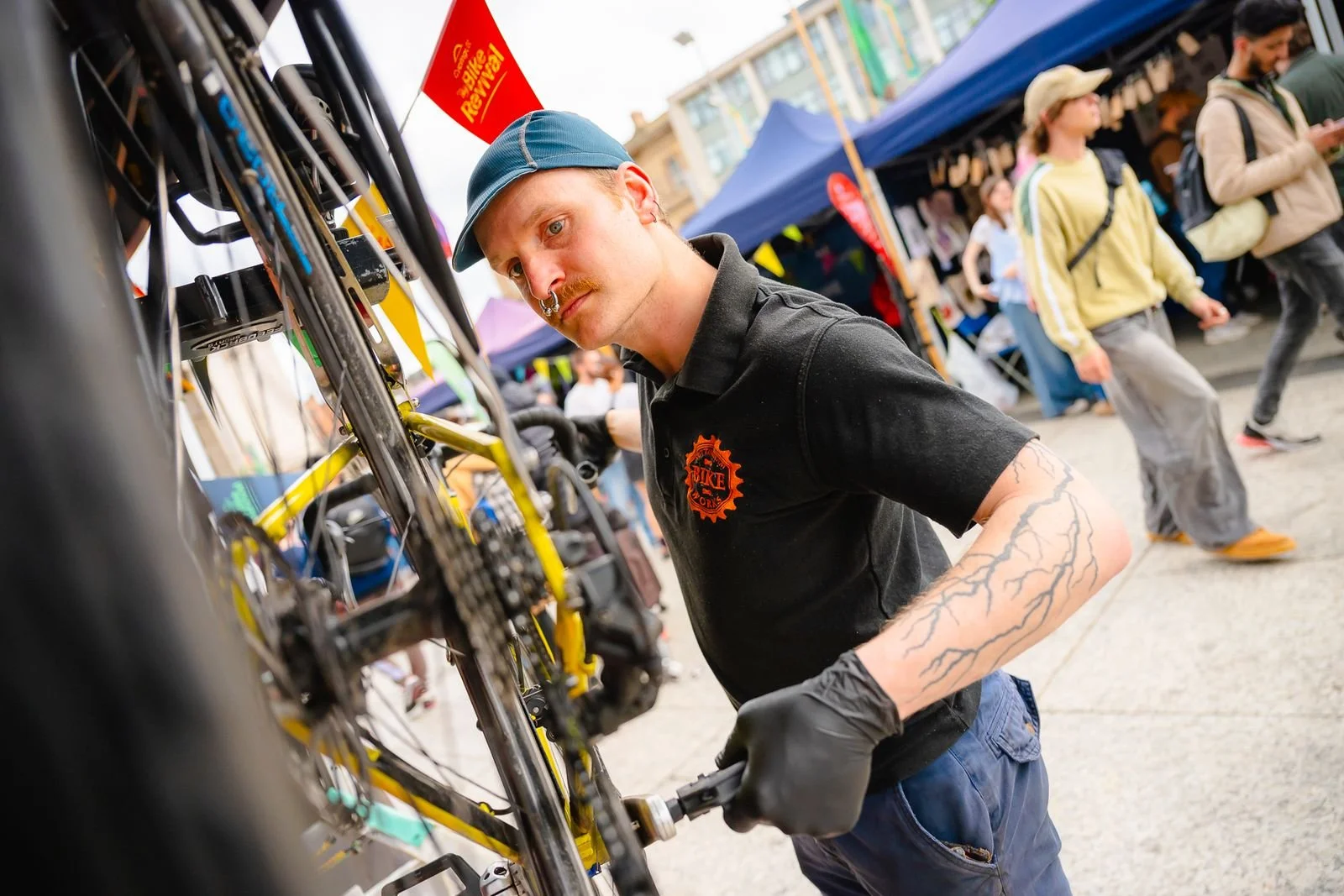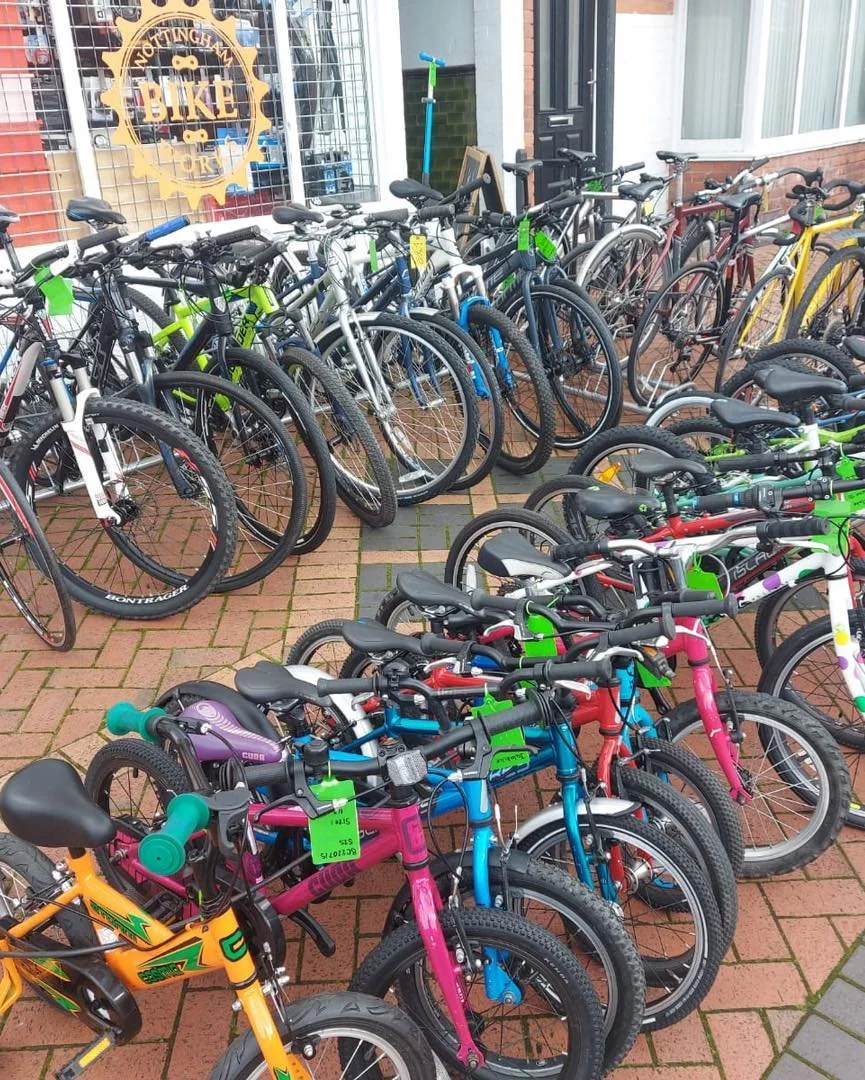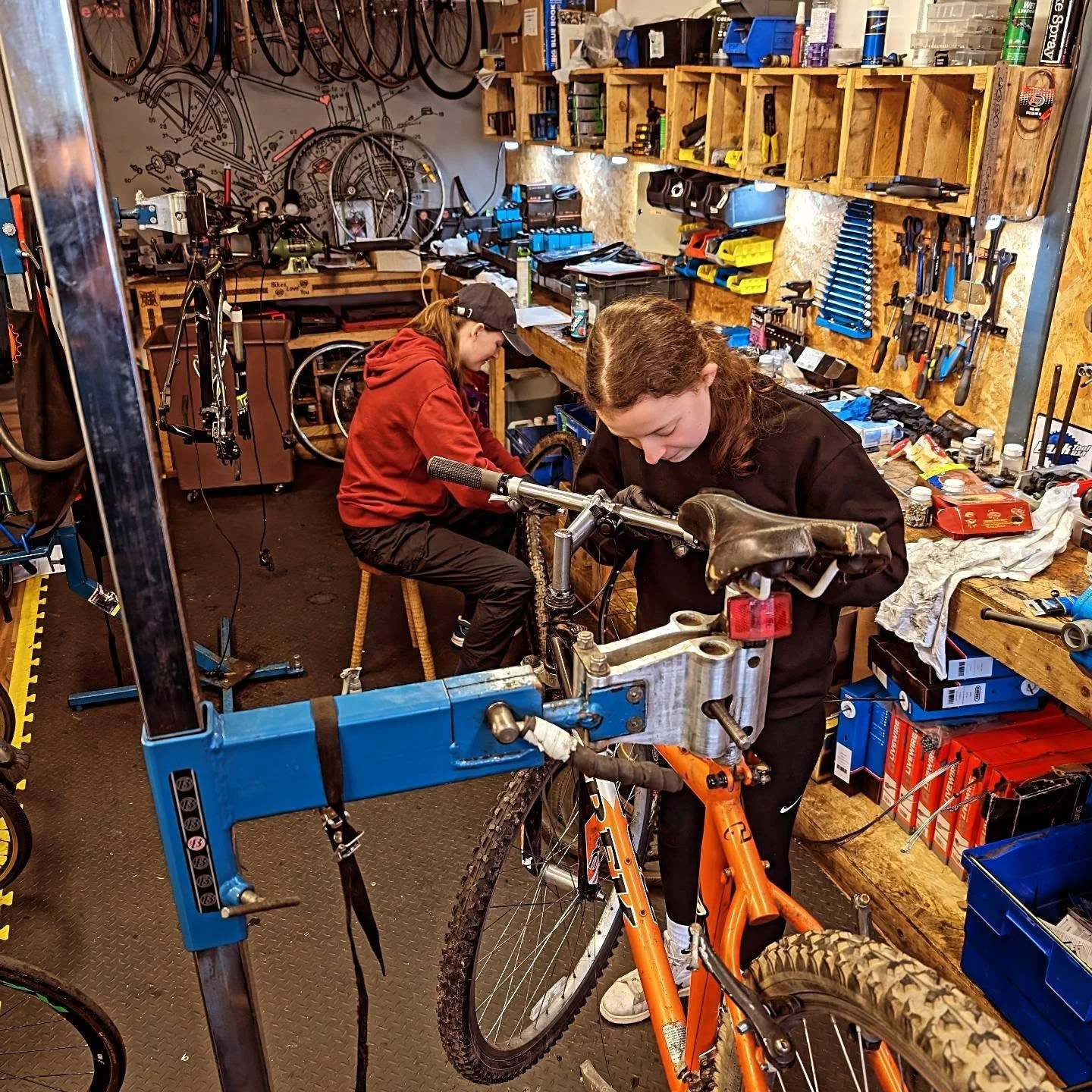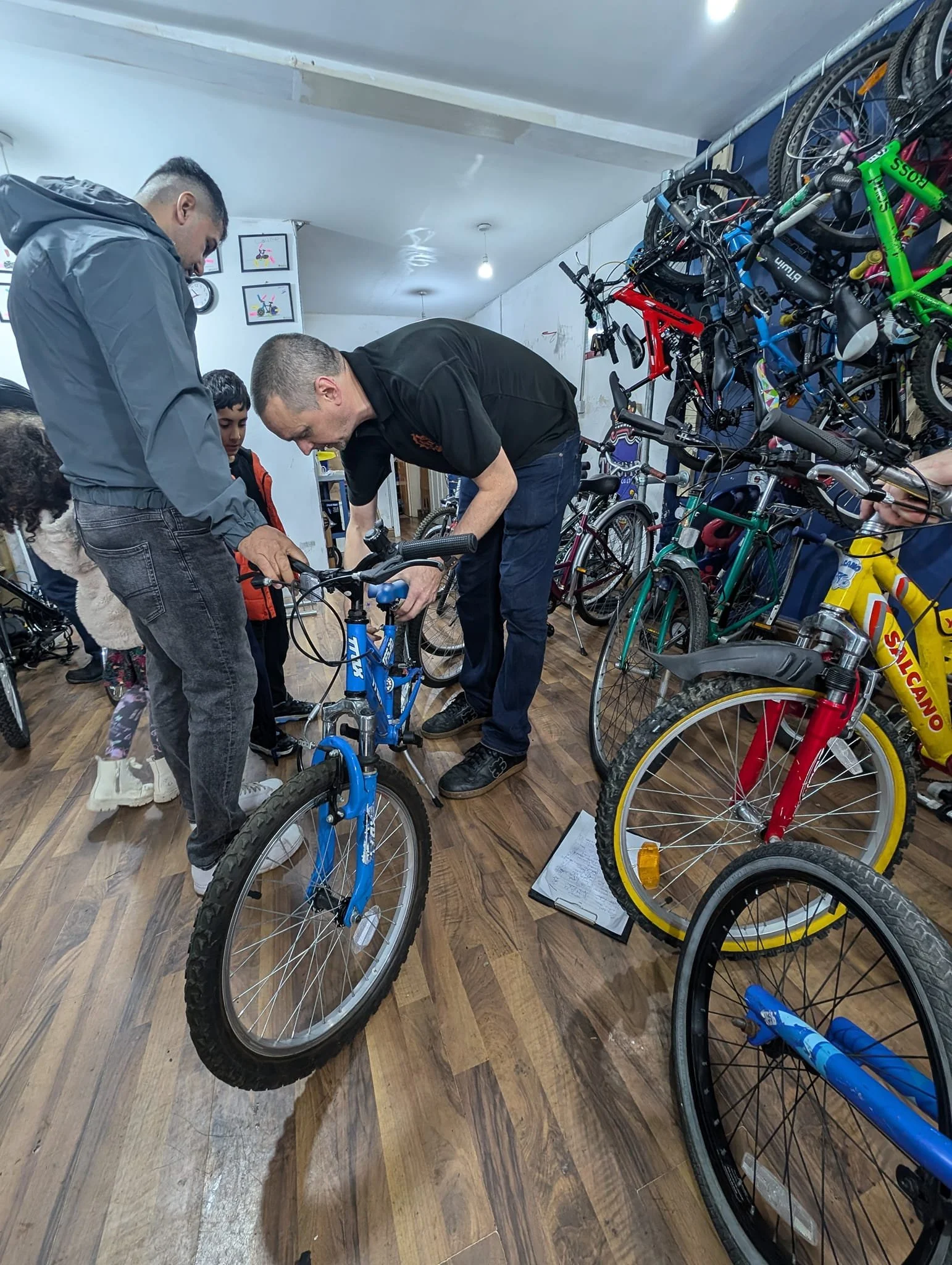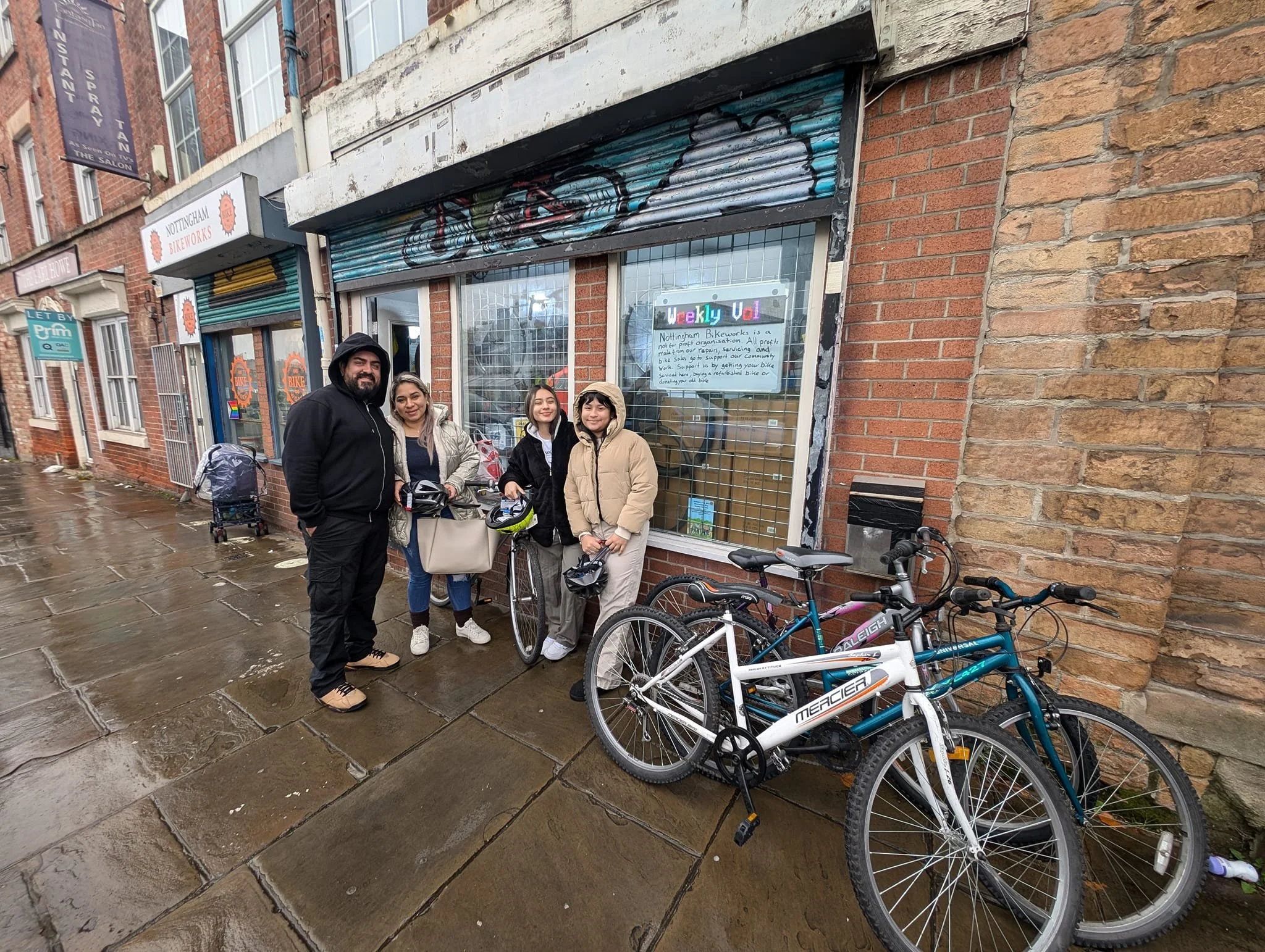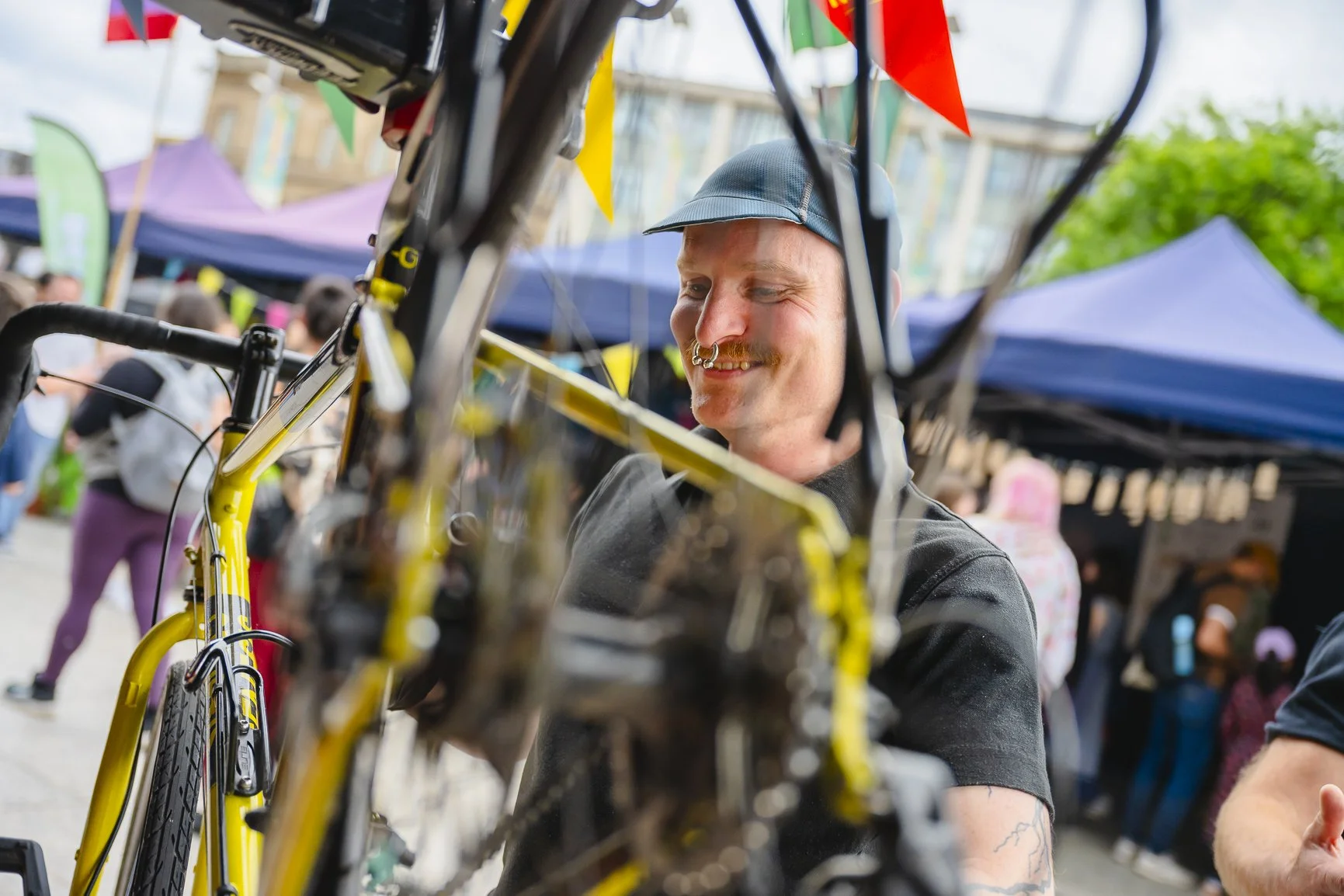Richard Jackson - Nottingham Bikeworks
Interview with Richard Jackson, written by Andy Barrett
As someone who relies on public transport and my bicycle to get around the city, I thought it was about time I learnt a little more about Nottingham Bikeworks, a social enterprise that aims to encourage and support people to get out of their cars and use pedal power. I was met by Richard Jackson who first started with the company as a volunteer in 2018.
What is Nottingham Bikeworks?
We're a not-for-profit bicycle and repair shop in the city that has been going for a little over ten years now. People donate their old bikes to us which we refurbish and sell and we also repair bikes and sell accessories. Any profits are used for our community-based work and projects, such as giving bikes free of charge to people who need them. This year we've been giving a lot of bikes to job seekers; last year we gave around 250 bikes to asylum seekers and refugees in the city. Throughout the pandemic we were giving bikes to NHS workers.
How can you do that?
We work with a number charities, such as Sustrans, and there are always programmes running which we look to engage with. There’s currently a national Active Travel Fund scheme which the city council was successful in getting money from which is allowing us to run the free bike scheme. The ATF is also connected to a project called Travel Well which is exploring the positive impacts of cycling and walking on our mental and physical health and is really worth taking a look at.
‘Active Travel Fund schemes make it easier, safer and more attractive for people to walk, wheel, scoot and cycle. Nottingham City Council bid for £2m to improve active travel measures across the city. The initial funding was awarded during the Covid-19 pandemic to improve temporary access to walking and cycling, a further bid (Active Travel Fund 2) followed to make some of these schemes permanent and expand the scope of our cycle network’.
So in terms of giving bikes to Job Seekers we’re sent a list of referrals from Sustrans and we invite those people to come into the into the workshop to get a little maintenance class about how to look after their bike and to have some ride training as well, to make sure they know how to ride a bike safely; especially on the roads around here where sometimes it can be a bit hairy.
If you would like to know more about the scheme, or to apply to be a part of it, then have a look here. Information on the Travel Well grant scheme can be found here.
How many bikes get donated and what type do you get?
Sometimes a bicycle has been sat in somebody's shed for the last thirty or forty years, and sometimes it's a bike that someone has recently bought but doesn’t need anymore. They come in all shapes and sizes and in all conditions, and the numbers that we get given really varies. Throughout the pandemic and the lockdowns, we were getting dozens of bikes every week; whereas now I'd say we average around one or two a week. We mainly get adult bikes, but people do bring in ones that their kids have outgrown. A couple of years ago we ran a programme where people could bring their old kids' bikes in and swap them for a bigger one. That was really popular and worked out really well. Again, that was a funded project.
Do you get a lot of old Raleigh bikes?
Quite a lot! Obviously in this area they're very popular. I'm currently riding a Raleigh that I’ve refurbished.
How did Bikeworks begin?
It was founded in 2013 by a group of bike mechanics and people who liked cycling. None of them still work with us, although a few are still in the cycling industry. I'm not exactly sure what the impetus was to begin with as I never met any of the founders, but from what I understand they wanted a community-based cycling shop to be established in Nottingham. There were a few others around the country at the time, in London and places like Bristol where cycling is a very big part of the culture.
Here’s an example of a Bristol based community cycling company and you may be interested in seeing what Bristol Cycling Campaign are up to.
Since that moment it's remained part of our ethos to promote cycling to everybody and to help people not only get onto a bike but to stay on a bike as well. You can give someone a bike but if they don't know that they can fix it, if they don’t know what to do when they get a flat tyre, then they’re more likely to get back into their car. Our constitution means that we’re never going to be a profit-making shop, although of course we have to cover costs and pay the staff. And we’re also absolutely about engaging with the widest possible community of cyclists; if you've got a bike that needs looking at, or if you need a bike then come to us.
Originally the shop was in Radford, just off of Forest Road and around three years ago the shop moved here to Sneinton Market, and at the same time another shop was opened on Trent Boulevard in Lady Bay. There's a board of directors that oversee the whole thing; a managing director (Ian Keetley), and then a group of mechanics, most of which worked in other cycling shops before coming here. There’s around ten of us all together across both sites with different teams working in each shop; although if we need to cover staff then we swap around. But it's easier to keep things separate because each shop gets their repeat customers and its helpful for everyone if you know who you’re dealing with.
There’s also a good team of volunteers who help out with admin and around the workshop as well. Sometimes those are people that we've met and can see that they’re good at what they do and sometimes people approach us with their skills. Sometimes we've been able to do some supported volunteering where we get a few people into the workshop who are not necessarily at the level where they can work as a mechanic, but they know enough to start or finish a job and we can train them up. If there is anybody reading this who really knows their way around a bike and might be interested in volunteering then they should definitely contact us.
What’s been your journey to Bikeworks?
My first bike, when I was about three or four, was a Raleigh and I was taught to ride up and down the pavement, like many others in Nottingham. I kept riding throughout my childhood, it dropped off a bit in my older teenage years, but when I got a job and needed to travel, I bought a bike. Luckily, I grew up on the west side of the city which is nice and flat and wonderful for cycling. At that point I started working on my bicycle in my back garden to keep it in good shape and learning what to do from reading books and watching YouTube videos. Over the years I learnt a fair bit and then volunteered here where I learnt a lot more. A position opened up for a trainee mechanic, which I was successful in getting; and I’ve stuck with it and am now a fully paid-up member of the team. I’ve also moved to the other side of the city and have to get up and down Carlton Hill every day.
Is it a challenge to keep things going?
We’re a CIC (a Community Interest Company) which means that we’re not-for-profit and have no shareholders, although we try and make a profit like any other shop so that we can carry out our community-based work. As well as offering commercial repairs and selling refurbished bikes we also apply for a lot of funding. There are the obvious charities like Cycling UK and Sustrans, but we also look at opportunities from non-cycling specific organisations. The Co-op Local Community Fund has given us funding for a Free Fixing Fridays service which allowed people to come in and get their bike fixed and even the Clothmakers’ Foundation has given us a grant in the past, which we used to fund free repairs for NHS workers during the pandemic.
You mentioned that in Bristol cycling was a key part of the culture? Is it so in Nottingham?
I think there is a long history of cycling being an integral part of Nottingham culture, especially with Raleigh being the biggest bicycle manufacturer in the country and I’ve seen and worked on Raleigh bikes all over the world. I think it's getting better to cycle around Nottingham. There has been a lot of investment in new cycle lanes and especially in segregated cycle lanes where you have a curb separating it from the traffic. They're so much safer and nicer to ride in. The one on Castle Boulevard has been working really well for a few years now and they've just installed one on Porchester Road.
Every time I've been in one of those cycle lanes I see other cyclists regardless of what time of day or year it is. And with all of the new bits of infrastructure I think it is encouraging more cycling. I think the Lime Bikes are helping to get people used to the idea of cycling and to realise that cycling is a fun and cheap way of getting around the city.
Then there is Critical Mass on the last Friday of every month, which meets in the Market Square. That’s a worldwide movement that started as a form of protest, but it basically a group of cyclists gathering informally to ride around their city and to be as visible as possible on the roads. As well as offering safety in numbers it makes motorists more aware that cyclists have got a right to be on the roads just as much as they have.
To find our more about Critical Mass in Nottingham, and how to join in on a ride, go to their Facebook page or see them on Instagram.
When I was a kid I remember people coming to our school to teach us cycling proficiency; does that still happen?
Yes. They've changed the name; it’s now called Bikeability; and some of the charities we work with, like Sustrans, go around to schools to teach that. I've even visited a couple of schools where they've got a proper road system mapped out on the playground for the kids to ride around on. If you can encourage children to ride and teach them how to do it safely, hopefully they'll do it for life.
Are electric bikes bringing more people to cycling and do you work with those here?
They're very expensive and heavy and are a very different thing, but I do see a lot of them around and they’ve obviously really boomed in the last few years. But there are a lot of poor-quality e-bikes out there, particularly when people get a really cheap add-on kit from China. Many are not well made at all and they’re often illegal; if you see someone going up a hill without pedalling at thirty miles an hour it won’t be on a legal e-bike. But you can get some really good ones and they do help to keep people using bikes longer than they otherwise would. My dad is in his late sixties, was struggling to keep cycling, and I bought him a kit from a company called Swytch. They send you a motorized wheel and a little battery pack and he’s back on his bike and loves it.
Here is a useful article on ‘Which e-bikes are illegal in the UK?’
We do work with electric bikes, especially in this branch, particularly for delivery riders and couriers. They have big, heavy electric bikes which often go wrong. They’re usually more difficult to work on and if they’re obviously illegal then we can’t get involved because of insurance purposes; but we'll try and help where we can.
I think one of the reasons why people worry about cycling is safety; both in terms of the possibility of having their bike stolen but also in terms of personal safety on the roads.
There are quite a few of those big metal staples that you see around the city that you can lock your bike to. I've got two quite hefty locks for mine and I've never had one stolen. The more you spend on security the more secure your bicycle will be. But nothing's foolproof. If somebody really wants your bike, they'll stop at nothing. You should also register your bike on the National Cycle Database which is an online register of bikes with a picture and description. There’s usually a frame number on every bicycle to identify them so you should look for that. You have to pay a little bit to register, but every now and again you’ll see the police giving out free bike register stickers, so do take one of those.
In terms of personal safety always make yourself as visible to other road users as possible; which usually means wearing some kind of high-vis clothing. Lights are really important and I ride with my lights on even during the day. Helmets are also important in protecting against head injuries if you do have a crash. Whilst I don't know anyone who has one you do see some cyclists with a little GoPro camera on their helmet, which can be a good way of getting evidence if you do have an accident because of car drivers’ behaviour, or reporting drivers who are passing too close to you.
When you're sitting on the bicycle seat you should be able to lean a little bit to the side to place the tops of your toes onto the ground. You should be able to stand comfortably over the top tube, the straight bit along the top of the bike, with your feet flat on the ground. And a general rule of thumb is that if you put your heel on the pedal, you should be able to extend your leg all the way down to the bottom of the pedal stroke. But normally you ride with your toes on the pedal so you should have a little bend in your knee, even when you're right at the bottom. You don't want to be hyper-extending your knees.
So if somebody from the Meadows is thinking they want to have a go at cycling, what would your advice be?
I would say buy a bike from a bike shop rather than online, because a bike shop will have checked it over to make sure it's safe; that the tyres are pumped up, the brakes work well, the gears change smoothly, and the seat and handlebars are in the right position. Talking to a shop will also ensure you get the right size and the right style of bike. If you've never ridden before then take your bicycle to the park or somewhere similar and just have a go getting on and setting off, moving, turning and stopping. There are some services around the city that can help you learn to ride a bike.
Ride Training is offered by Ridewise and Women in Tandem.
You might have seen blue circular signs on the pavement with a picture of pedestrians and a bike; there are a lot of them around. That means cyclists are welcome to use the pavement so if you need to build your confidence before you go on the road don't be afraid to ride on those; just try and respect the other people using the pavement.
Cyclists are entitled to cycle on any roads that aren't motorways, but of course the faster and busier the road the less safe or pleasant it will be. If you're starting out try to stick to quieter roads. There are also specific bike tracks and part of the Sustrans National Cycle Network passes through Nottingham. The point of that is to be accessible to every ability of cyclist and there's a whole network all around the country, on off-road or quieter roads. In theory you can get anywhere on them and I've been as far as Birmingham, which took me about six hours.
Here is Nottingham’s Cycle Route map, which is also available at the Tourist Information Office in Old Market Square.
Nottingham is part of the National Cycle Network Route 6, which is 442 miles long.
And maintenance? For some people, including me, even the idea of taking off a back wheel is kind of horrifying. Are there places where you can learn about that?
Sometimes we host little mini maintenance classes; it depends when we can get funding. But with most jobs once somebody has showed you how to do it it’s not that difficult. And there are always YouTube videos! If you'd rather just bring it to a shop, it only takes five-minutes to fix a puncture so it’s something that can usually be done while you wait. In The Meadows you have Cycle Saviours, which is a brilliant organisation that does simple bicycle repairs for small donations every Thursday at the NEP Climate Hub, on Turney Street.
There are some bits of a bike that will naturally wear down, like the brake pads and the chain, which after all is just lots of little bits of metal continuously rubbing together. You do need to keep things oiled; the cleaner the bicycle is, the better it will work and the longer it will last. But it doesn't cost a lot to maintain a bicycle. I put aside £15 every month to cover bus travel and my bike, and that does me fine.
And what kind of cost are we looking at for purchasing a bike?
The cheapest ones we sell are about £100 for a refurbished bike. That comes with any new parts it might need and a guarantee. You can get them cheaper from other places. People can spend thousands on their bike, especially some of those in the touring clubs. Most people ride either a mountain bike or a hybrid, so flat handlebars, medium wide tyres, and a decent range of gears to get up the hills. If you're in a cycling club you might have one with drop handlebars and thinner tyres. I'd say for general cycling, a hybrid is the best option because you can go on the roads, through the park, along the canal.
What are the benefits of cycling, both environmentally and personally?
There's so many! Environmentally, of course, there's no emissions so it's better for air quality. It's better for the urban environment as well because it takes up much less space than a car. It makes a lot less noise than a car; it takes up so much fewer resources to make than a car. So, the environmental benefits are wonderful.
It also benefits your physical and mental health. It’s really good just to be in the fresh air rather than stuck inside a vehicle, and there are so many wonderful rides you can take, like along the canal path to Attenborough Nature Reserve. And of course it’s cheap. I don't pay for fuel; I pay very little for maintaining the bike; and bikes cost a lot less than a car to buy. In my mind there's no reason not to cycle!
What projects are Bikeworks involved in at the moment?
We’re doing a few different things for the Big Bike Revival which is run through Cycling UK, like the free bike repairs which ran every Thursday morning throughout July and August; and the Bike Kitchen which ran in the evening where mechanics were on hand to provide tools and give advice to people who want to maintain their bicycles. We continue to turn up at all kinds of events to run a Dr. Bike service where we mend people’s cycles for free; and we're continuing to run projects with Sustrans and with Travel Well to give free bikes to job seekers and people who need them for their physical or mental health. We're always looking for more funding to keep doing more community projects, so do keep an eye on what we’re up to.
If you’d like to support Nottingham Bikeworks, or find out about their current projects then have a look here.
What are you proudest of?
There's a lot to be proud of and it's hard to choose, but perhaps the free-fixing Thursdays. It used to free-fixing Fridays, but that was a bit of a mouthful and logistically it worked better on a Thursday. At the moment that’s open to the general public thanks to the funding that we’ve got but generally every Thursday if somebody’s on benefits or universal credit, or if they're struggling in other ways, they can just bring their bike along here, to the Sneinton shop, and we'll fix it for them at either no cost or for as low as we possibly can; just to help them stay cycling. That project has been running for around four years now and has almost always been self-funded rather than being run through grants. So, any money that you do spend in the shop helps to go towards providing that service.
And future plans?
We'd like to be able to reopen our scheme providing free bikes for asylum seekers and refugees, because it's such an important service for them. It's a good welcome to the city and really opens it up to them. It means they can get around to English classes, go and see their friends, build a bit more of a community, and just enjoy themselves more in Nottingham.
And finally, are there any particular cycle journeys that you could recommend?
I tend to stay around Nottingham and like to go out towards the Grantham Canal. It’s quite flat in that direction; the more north in the county you go the hillier it tends to get. The manager and his daughter did the Velo Belvoir recently which might appeal to more sporty cyclists; and a really good local organisation to check out for cycling trips is Zig Zag Tours. I've bought a few of the maps of the National Cycle Network and you can always take a bike on the back of a car or on a train, although there is often competition for space and you usually need to book ahead. I’ve found that in Europe they tend to have a much better relationship between trains and bicycles. In Denmark there was a whole carriage just for bikes; you could fit thirty or forty in there. I’d love to see that in the U.K.
Here are the cycle policies for the different UK train companies.
If you do want to cycle abroad the Netherlands, like Denmark, is nice and flat, which is always what I’m looking for. There are lots of companies now who can organise a cycling holiday if you want to give it a go. Some will have a support van with extra parts and a mechanic, and will take your bags as well so that you just ride between a couple of hotels. The great thing about cycling is that once you start to explore the options that are available to you on a bike the world can really open up in a new way. I can’t think of many things that can have such a profound effect on your life for so little a cost.




